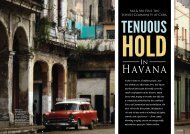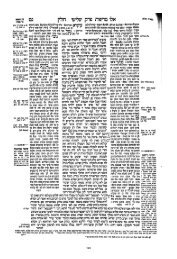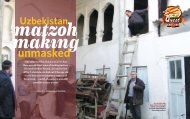The Jews of Namibia - Halachic Adventures
The Jews of Namibia - Halachic Adventures
The Jews of Namibia - Halachic Adventures
Create successful ePaper yourself
Turn your PDF publications into a flip-book with our unique Google optimized e-Paper software.
W<br />
We were i n South Africa for what were<br />
supposed to be a few relatively quiet days<br />
— giving a few lectures, visiting some old<br />
synagogues, and shechting cows and sheep. But as we’ve already learned time and<br />
again, on our halachic adventures, things can turn interesting in unexpected ways.<br />
Several hours before Shabbos we heard the phone chirp, indicating an SMS: “Would<br />
you like to shecht buck in <strong>Namibia</strong>” Well, an opportunity like that is irresistible to a<br />
pair <strong>of</strong> halachic adventurers like ourselves, and so Erev Shabbos we were busy booking<br />
flights to South Africa’s neighboring country.<br />
We got the last two seats on a Sunday morning flight to Windhoek,<br />
the capital <strong>of</strong> <strong>Namibia</strong>. Formerly known as South West Africa,<br />
<strong>Namibia</strong> gained independence from South Africa in 1990,<br />
and is blessed with extensive game and African wildlife. We were<br />
being sent by Rabbi Desmond Maizels, a kindred spirit and friend<br />
as well as a rabbi in Cape Town who periodically shechts for the<br />
few <strong>Jews</strong> in <strong>Namibia</strong>. He told us that we would have an adventure<br />
as well as enjoy the hospitality <strong>of</strong> the central Jew in town,<br />
Zvi Gorelick, and he was correct on both counts.<br />
<strong>Jews</strong> in <strong>Namibia</strong> Zvi Gorelick, our warm and welcoming<br />
host, is the man who single-handedly keeps this<br />
community going. He told us how the first <strong>Jews</strong> came to<br />
<strong>Namibia</strong> in the 1880s looking for business opportunities in<br />
guano, a widely used fertilizer from the feces <strong>of</strong> sea birds,<br />
bats, and seals, found in great unadulterated quantities<br />
<strong>of</strong>f ocean coasts. <strong>The</strong>se Jewish entrepreneurs were given a<br />
communal boost when the region came under German rule<br />
in 1884: Jewish soldiers numbered among the occupying<br />
German army.<br />
In a 1915 side battle <strong>of</strong> World War I, South Africa defeated the<br />
Germans and occupied what they called South West Africa, yet<br />
even today, close to a hundred years later, there is a distinct German<br />
character to the town <strong>of</strong> Windhoek. Many <strong>of</strong> the stores and<br />
restaurants have German names and even write their menus in<br />
that language. Many <strong>of</strong> the whites we saw spoke German, and<br />
“Would you like<br />
to shecht buck in<br />
<strong>Namibia</strong>” Well,<br />
an opportunity<br />
like that is<br />
irresistible to a<br />
pair <strong>of</strong> halachic<br />
adventurers like<br />
ourselves<br />
there are direct flights to Germany a few times a week.<br />
Southern Africa was actually a distant, safe haven<br />
with fresh opportunities for persecuted Eastern European<br />
<strong>Jews</strong> in the early 1900s. Zvi’s father, Samuel,<br />
was 16 years old when he arrived in South Africa in<br />
1925 from a village near Minsk in the Pale <strong>of</strong> Settlement.<br />
He was a saddle stitcher, but the age <strong>of</strong> horses<br />
was pretty much over, and he soon found employment<br />
fixing car seats. But then the Depression hit<br />
and many local <strong>Jews</strong> found themselves out <strong>of</strong> work,<br />
spending their days in Cape Town drinking tea and<br />
eyeing the future. Presently two Persians by the name<br />
<strong>of</strong> Azizoloh<strong>of</strong>f (whose South African descendants we<br />
serendipitously know) showed up<br />
transporting Persian lamb, Karakul,<br />
which they planned to raise<br />
in the country. <strong>The</strong>y were looking<br />
for opportunities in South West<br />
Africa and Samuel decided to<br />
join them.<br />
Refuge in the Bush<br />
<strong>Namibia</strong> is one <strong>of</strong> the least<br />
populated (2.1 million) and<br />
least densely populated (6.6<br />
per square mile) countries in<br />
the world, and the capital and<br />
largest city Windhoek has<br />
only 240,000 people. But the<br />
country is blessed with fauna,<br />
KOSHER FOREVER Windhoek’s cemetery is the most<br />
accurate witness to the city’s Jewish citizens; (right) Walter<br />
Galler’s wife paid tribute to her Jewish husband by cutting<br />
the Hebrew words <strong>of</strong>f a matzoh box, even though they<br />
wound up upside down on the tombstone<br />
Zvi Gorelick is <strong>Namibia</strong>’s gabbai,<br />
melamed, kashrus supervisor,<br />
and chevra kadisha<br />
48 MISHPACHA 17 Av 5773 | July 24, 2013 MISHPACHA 49


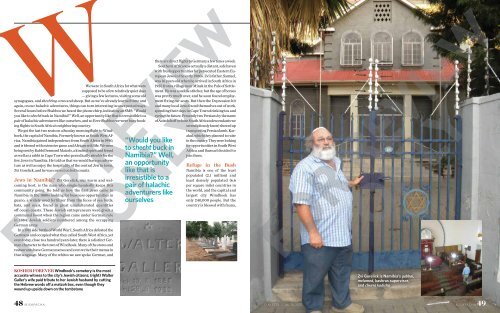
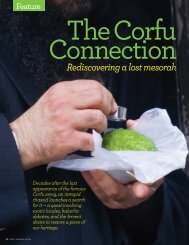
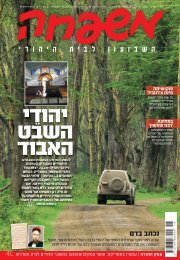
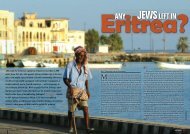
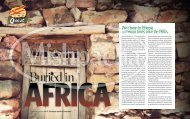

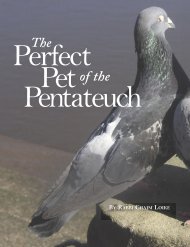
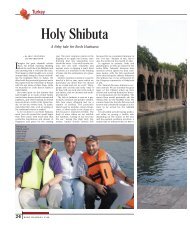
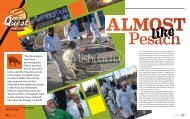

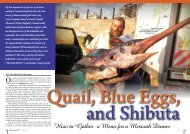
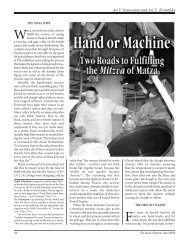
![llVtlwnl 1p1l 1biip 3 K11lnM o1it1 [1] - Halachic Adventures](https://img.yumpu.com/35271577/1/190x253/llvtlwnl-1p1l-1biip-3-k11lnm-o1it1-1-halachic-adventures.jpg?quality=85)
